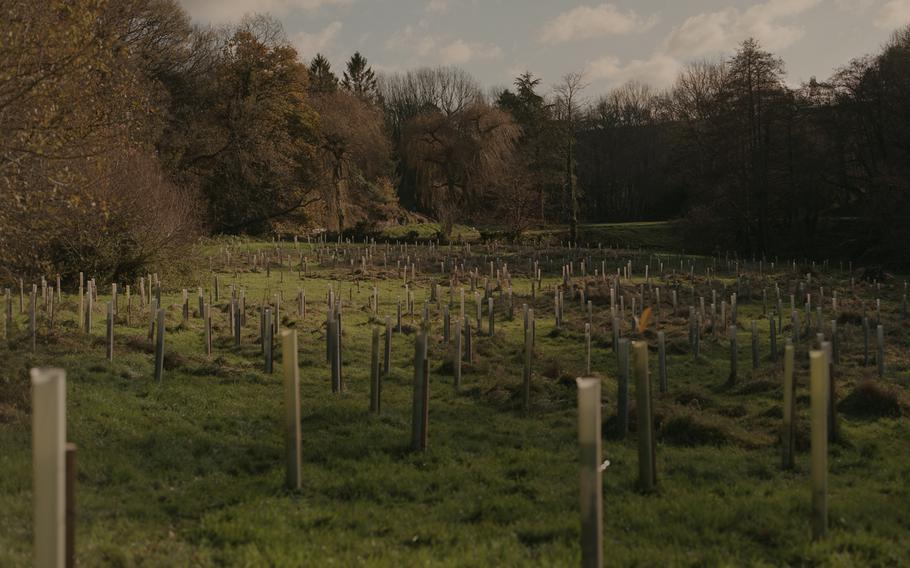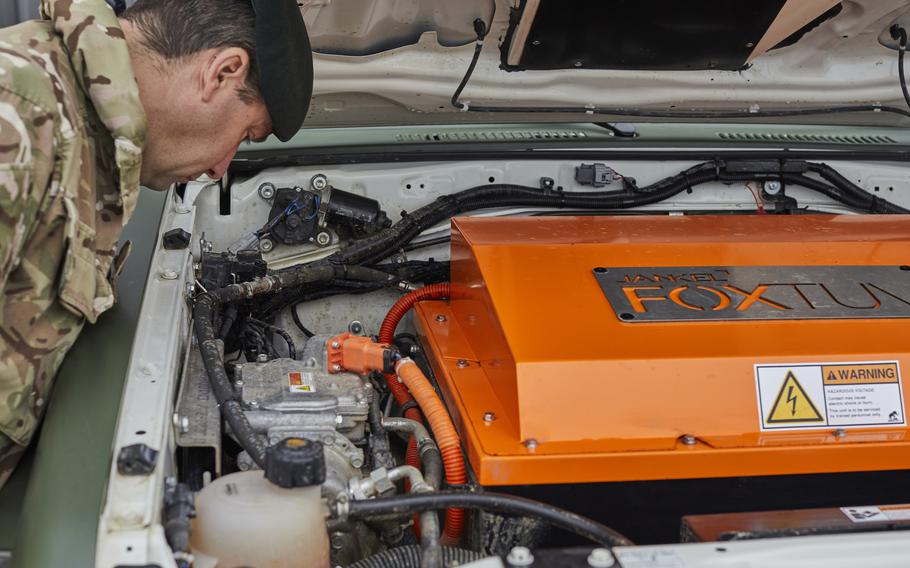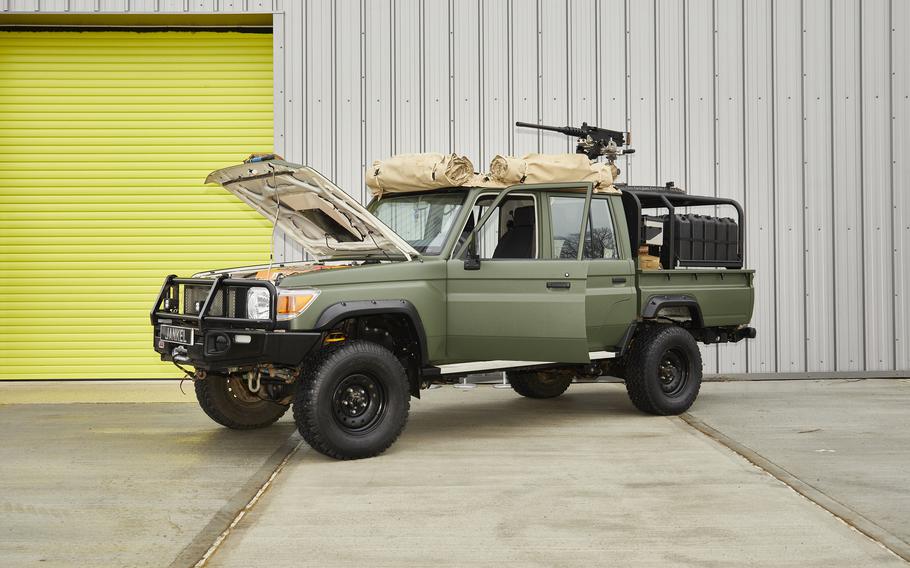
Lt. Gen. Richard Nugee, a retired senior British army officer, stands near his home in Devizes, England, on Dec. 4. (Tori Ferenc/For The Washington Post)
GLASGOW, Scotland - It was July 2003, and Richard Nugee, a British army officer, was baking inside the sweltering brick building that Saddam Hussein’s sons used as a smuggler’s hideout.
Until a few months prior, it had been a port authority office in Saddam’s Iraq. Now it was Nugee’s headquarters and living space as he commanded British troops across a strategic stretch of southern Iraq. But with the thermometer routinely topping 120 degrees, a harsh wind blowing humid air from the Persian Gulf and no air conditioning, he had a big problem. His troops were drinking so much water that they were flushing away their vitamins. It was nearly too scorching to fight. And he was getting a lesson that extreme weather could be as dangerous to soldiers as any insurgent.
Nearly two decades later, Nugee was a three-star general at the peak of his career, after a long string of deployments in the world’s conflict zones, including Northern Ireland, Bosnia, Kosovo and Afghanistan. He had risen to become one of the most senior officers in the entire British armed forces - an elite club charged with commanding continents. And in the final fight of his military life, he decided to take on one of the wiliest adversaries: climate change. Militaries are both enormous emitters and facing fearsome new conflicts sparked by global warming. Nugee resolved to fight a lonely battle to address both problems.
Militaries are not known as bastions of tree-huggers. Fighting a war burns prodigious quantities of fossil fuels. The Pentagon, by some counts, is the world’s largest institutional consumer of oil. And military leaders have often resisted anything they fear would blunt their edge, including cutting back on emissions.
On his own time, Nugee was a convert on climate issues. He covered his house with solar panels. He replanted native trees across his fields. But when he put on his medal-bedecked uniform every morning and went to work, he found himself surrounded by colleagues he felt did not appreciate how a warming world was going to affect them.
“Having really seen defense from the heart of it, I had drawn the conclusion that it was not paying any attention to climate change at all, and I wanted to change that,” Nugee said last month in a crowded hotel bar in Glasgow, Scotland, where world leaders, ministers and titans of industry had gathered for a United Nations climate conference.
Nugee had retired from active duty a few months earlier, trading his trim officer’s dress uniform for a civilian’s blue suit. Every now and then, he glanced down to check the time on his phone. He didn’t want to miss a climate gala hosted by Prince Charles, a fellow nature-loving Englishman, in the ballroom next door. He spoke crisply, and with purpose: the speech of a man who is accustomed both to his orders being followed - and to being met with skepticism from the fellow gray-haired clan of officers and ministers who oversee Britain’s powerful military.

Trees planted by Richard Nugee. (Tori Ferenc/For The Washington Post)
‘Anybody who ignores it would be foolish’
Convinced that someone needed to shake awake Britain’s security establishment about the risks of climate change, Nugee asked to be tasked with one final mission before he turned in his stars and retired: preparing a strategy for the British military to adapt to a dangerously warming world. To do so, he gave up command of a staff of more than 600 as the head human resources officer of the British military. Instead, he would be in command of his own desk. Shorn of resources, he was forced to beg and borrow brainpower.
He assembled a step-by-step plan to slash military emissions and prepare the armed forces for a hotter planet. Wars may be fought over access to water. Millions could be forced to migrate because of extreme weather. Emboldened rivals such as China and Russia are already starting to plow their warships across the melting Arctic. The strategy was published earlier this year.
“This is not doing it for moral reasons. This is not doing it because it’s about emissions. It’s about our own capability, it’s about our ability to be the most successful and the most credible force that we can,” Nugee said in Glasgow, where he was one of few with a military background amid the galaxy of people trying to fight for a cooler planet.
“Anybody who ignores it would be foolish,” he said.
Spending time in Glasgow meant sharing a city with fellow travelers who, at least outwardly, had a far different style from his upright soldier’s mien. Swedish climate activist Greta Thunberg led protesters in angry chants. Other demonstrators staged die-ins at the conference’s gates. Nugee favored suits over protest signs. But what he was proposing was revolutionary: a British military that by 2050 would reduce its net emissions to zero and transform into a sharper fighting force in doing so.
Nugee said his challenge was to explain to skeptical defense officials that addressing climate change improves military effectiveness, rather than sapping it.
“If we fight a war and we come second, but we can proudly say we’re the greenest army on the battlefield, we’ve still come second in the war,” said Nugee, adjusting his horn-rimmed glasses on his nose. “That’s not what we’re paid to do.”
Nugee, 58, grew up the youngest of four brothers, part of a sprawling English family in which he was always the baby. During World War II, his mother was a code-breaker at Bletchley Park, the British intelligence hub. His father was a lawyer, and Nugee’s brothers followed their father into that profession. But Nugee himself took inspiration from his grandfather, an army officer who fought in both world wars. A conversation the two of them had about his grandfather’s wartime experiences, three days before his grandfather died, inspired Nugee to sign up for the army at age 16.

Members of the British Armed Forces examine a concept demonstrator version of the Jankel Fox Rapid Response Vehicle at Dorset Innovation Park in England on Dec. 14, 2021. (Rhiannon Adam/For The Washington Post)
Hot spots of the day
“My parents were astounded,” Nugee said in a later conversation on a clanking train from Glasgow to Edinburgh, where he was staying during the climate conference with a childhood friend. He stared out the window at the Scottish countryside that was speeding by. “I don’t think they knew what I was going to do at all,” he said.
His career reflected the hot spots of the day. In the waning years of the Cold War, he was posted to West Germany. Then there were repeated deployments to Northern Ireland, which was still consumed by the sectarian insurgency known as the Troubles. In the 1990s, he went to the former Yugoslavia as it fell apart in bloody wars.
But it was his post-2001 deployments that helped drive his belief that adapting the military to climate change would improve its ability to do its core job.
The heat in Iraq, for instance: In 2003, Nugee had to call in an airlift of bananas because so many soldiers’ potassium levels were plunging to dangerous lows. Colleagues back in Britain laughed at him, but the need was deadly serious, he said. Eventually the British troops responsible for securing southern Iraq managed to get air-conditioned living quarters - which was a battlefield advantage if their opponents lacked similar facilities, Nugee said.
“You’d be drenched going to the shower. You’d have a shower. You dry off. You’d be drenched before you got out of the shower cubicle because of the sweat,” Nugee said. “One of my soldiers got through 16 liters of water and still was dehydrated.”

A concept demonstrator version of the Jankel Fox Rapid Response Vehicle at Dorset Innovation Park in England on Dec. 14. (Rhiannon Adam/For The Washington Post)
Culture clash
Armed forces can be overlooked targets in efforts to go green. Under international climate treaties, militaries haven’t been required to be transparent about their emissions, one factor in a Washington Post investigation this year that found that countries are significantly underreporting their climate footprint to the United Nations. Armies have typically been exempted from national requirements to trim the heat-trapping gases they put into the atmosphere, since national security has trumped environmental issues.
“Usually people who care about climate change, the environmental movement and so on, they are not big fans of the military at all. They’re pacifistic in nature,” said Louise van Schaik, the head of European Union and global affairs at the Clingendael Institute, a Dutch international affairs think tank.
That culture clash can leave a big gap when it comes to addressing emissions. The British military emits as much as the rest of the British central government combined. As the second-largest landholder in the United Kingdom, it controls more territory than the queen, almost 2 percent of the nation’s landmass. The Pentagon has a similarly large footprint: It accounts for 52 percent of federal electricity use and 56 percent of the federal government’s emissions.
Yet environmental activists have often focused elsewhere, most typically on places where governments are obligated to be fully transparent about the environmental impact of their activities.
Military emissions “disappeared from the statistics, but it didn’t disappear from the atmosphere,” NATO Secretary General Jens Stoltenberg said in an interview during a visit to the U.N. climate conference, the first time a NATO leader came to the annual gathering. He had been lured to an event that Nugee helped organize, speaking alongside British Defense Secretary Ben Wallace about the urgent need for the world of defense to take steps to address climate change.
Mirroring Nugee’s effort in Britain, Stoltenberg this year has pushed the defense alliance to take up climate change as a security threat and to publish emissions data for the first time. The alliance leader, a former U.N. climate envoy, has talked about watching glaciers shrink in his native Norway over the course of his lifetime.
Preparing the armed forces
President Joe Biden has also pushed for more thinking about the intersection of climate change and security, ordering the Pentagon, the National Security Council, the intelligence community and the Department of Homeland Security to consider how a warming world will affect U.S. strategic interests. They released landmark - and somewhat apocalyptic - reports in October.
Nugee’s strategy stretches across 107 pages of dense, step-by-step analysis of what the British military needs to do about a warming world. He put it together during the course of 2020, at the height of the pandemic, hosting Skype and Zoom calls from his home near one of the British Army’s main training grounds in southwest England. When his laptop crashed, he would run over to a nearby base to get help.
The report suggests reducing military emissions to get in line with broader British climate targets. One recommendation is to fly military aircraft on 50 percent sustainable aviation fuel. Another is to increase the use of fuel-efficient hybrid electric armored vehicles - like Priuses, but for armored personnel carriers.
It warns that if the rest of society switches away from fossil fuels for cars and electricity, militaries can’t risk being the last ones who are reliant on them.
“If you want to be climate neutral in 2050, this sector can no longer be left off the hook,” said van Schaik, the Dutch climate security expert, who has reviewed the report.
It also aims to start preparing the armed forces for the harsher environment of the future: hardened hulls on warships that will need to spend more time in the ice-filled Arctic. Re-engineered ships will not be able to rely on seawater to cool their engines in the Persian Gulf if surface-level temperatures rise as sharply as they are forecast in the coming decades.
Perhaps most ominously, it lists the many ways global warming will destabilize nations and alliances across the world. Oil-rich nations such as Saudi Arabia will be upended if they have no takers for their main product and they become less strategically important. Access to the rare earth elements needed for batteries and circuitry could lead to clashes between China and the United States in places such as the Democratic Republic of Congo and Greenland. Countries where water shortages are likely - such as Iraq and Somalia - will probably face even more conflicts.
Top British defense officials say they are committed to addressing Nugee’s warnings.
“We have a strong obligation to make sure that our forces deliver a sustainable deployment and indeed make sure they move from traditional energies and fuel requirements to more modern requirements,” said Wallace, the British defense secretary. “But also we will have to deal with the consequences of a failed climate change policy, if that happens. We have to deal with the consequences of migrant flows, of breaking down of communities, of fights over rare resources, border frictions which will increase as climate change increases.”
The global efforts typically focus on two entangled issues: how to reduce the emissions of the national security establishment, and how to get ready for a world that will be more dangerous and unpredictable as the mercury creeps up in everyone’s thermometers.
“As the climate hazards have become more acute, and we’re seeing that more regularly, there’s a recognition on the security side, ‘Yeah, we’re going to have to deal with this, whether we like it or not, because it’s already here,’ “ said Erin Sikorsky, who until last year led analysis on climate change and security for the U.S. intelligence community and is now the director of the Center for Climate and Security, a Washington-based think tank, where she has worked with Nugee. “And on the environmental side, you’re seeing, ‘Yeah, this poses real risks of conflict.’ “
Some of the old-line security establishment in the United States and Europe is waking up to the challenge.
“Preventing climate-induced security risks, that’s a Nobel Prize-winning enterprise,” said Wolfgang Ischinger, the chairman of the Munich Security Conference, Europe’s main conclave for security-related discussions.

Lt. Gen. Richard Nugee at home. (Tori Ferenc/For The Washington Post)
125 degrees in Iraq
The weather in Iraq has only grown more extreme in the 18 years since Nugee’s first deployment, as it heats faster than much of the rest of the world. Temperatures in the country hit a record 125 degrees this summer. The United Nations has estimated that the desert eats up 100 square miles of farmland every year. Heat and water shortages have driven tens of thousands of people to leave their homes over the past decade, according to the International Organization for Migration. Those developments have exacerbated tensions and conflicts inside the country, even as it becomes harder for security forces themselves to keep the peace, since their vehicles don’t work as well in the heat.
And during Nugee’s repeated deployments to Afghanistan, climate-related considerations hit him from multiple directions. When farmers’ crops failed because of drought or other challenges, they became easy recruiting targets for the Taliban, which paid them roughly $5 a day to fight, and more if they killed enemy soldiers, he said.
Many of the Taliban’s targets were tied to the military’s dependence on fossil fuels. Diesel fuel is the key to much of modern war-fighting: It goes in Humvees and armored personnel carriers, and it gives remote outposts their electricity and communications when it is burned in generators.
But carrying the fuel to the places it needed to go was a perilous endeavor. Fuel tankers are hulking, slow-moving targets. They were sitting ducks, needing protection from vehicles on the ground and from helicopters in the air as they winded their precious cargo down contested mountain highways. The highest-ranking British officer killed in Afghanistan died in a roadside bomb attack on a resupply convoy. A U.S. Army study found that in 2007, there was one casualty for every 24 fuel convoys in Afghanistan.
So any effort to reduce the consumption of fossil fuels during deployments, whether by improving the fuel efficiency of tanks and transporters or through powering posts with solar power, can actually make soldiers better at their core job: fighting wars.
“There’s a military advantage in reducing all this logistic resupply. And then there’s a life advantage in reducing the number of people being killed. So there’s all sorts of advantages in going for more self-sufficiency,” Nugee said.
Nugee has had to battle skepticism inside the military, as opponents say that the focus on climate detracts from their core business.
Doubters can be dismissive of anything that, in their view, could make it more difficult to deploy speedily and effectively, Nugee said.
He also said they sometimes have an attitude that their willingness to die to defend their country means that they should not need to think about their carbon footprint: “’We’re prepared as individuals to make the ultimate sacrifice. Surely we’re prepared to have a few emissions to protect our citizens,’” Nugee described his detractors as saying.
He said that for years, he had been raising the issue of climate change in informal conversations with people working on military issues: his superiors, ministers, members of Parliament, colleagues. Often, he felt as though the challenge simply didn’t register for the people he was talking to, or that the military’s small pilot projects related to green technology were not nearly ambitious enough to meet the problem.
“There’s a very strong military lobby which turns around and says we shouldn’t be doing this, because we have a really clear purpose: that we will do whatever it takes to defend our nation,” he said.
Part of the challenge has been generational, he said: The older ribbon-bedecked officers at the top of the military chain of command weren’t paying enough attention to environmental issues. That stifled younger officers who might be more green-focused.
About two years ago, Nugee went to the defense secretary and to the British equivalent of the head of the Joint Chiefs of Staff, who is a friend.
“I said, ‘Look, I’ll do you a report, because I don’t think you’re taking it seriously enough. And I’ll tell you why you’re not taking it seriously enough and I’ll tell you what to do about it,’ “ he said. “My argument has consistently been: This is about enhancing capability. This is about thinking of doing things differently. This is about working with the green technology, not against it.”
Nugee retired from the military this summer - he was overdue after passing the typical retirement age of 55 - but he has stayed on to oversee climate work. Inaction now will lead to problems later, he said, as the rest of society moves away from using fossil fuels and Britain reduces its overall emissions, making the military an increasingly large target by comparison.
At home, Nugee said he is trying to do his part. After installing Tesla’s home battery, the Powerwall, his solar panels are able to keep him off the grid from April until October. He is investigating whether he can install a miniature hydropower system in a brook on his property to generate enough electricity to last him through the year.
And this month he set off on an expedition to Antarctica to commemorate the centenary of Ernest Shackleton’s final journey there. The mostly military and ex-military scientists on the trip will conduct climate and pollution research on Antarctica’s Forbidden Plateau.
Nugee said he hoped his climate efforts would be his legacy.
“It was what I was passionate about, in an environment where nobody was talking about it, and in an environment where actually, I could make a difference,” he said.